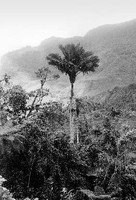Virgin echosystems.


Does not it pass unnoticed to our eyes, the discovery of 2 virgin ecosystems: one small in http://www.spiegel.de/wissenschaft/erde/0,1518,419483,00.html Israel and another of greater size, in Perú (El omercio.04/06/06), discovered by coincidence. In the first case, stonecutters that stirred in areas located 100 meters under the surface of the city of Ramle (between Jerusalem and Tel Aviv), discovered 8 new animal species (4 marine and freshwater crabs and 4 invertebrates), in the interior of a cave connected with marine water. The news -in this case- comes given because the 8 species –of 5 million years of antiquity- are blind, of birth. For other cases and especially for the Homo sapiens, the existence, adaptation and development of the sense of the view was fundamental for the subsequent development of the brain. These species show that to survive, the eyes are not necessary. According to the biologist: Hanan Dimantman, investigator of the Hebrew University of Jerusalem, these species have as one of their important nutritious bases to a chains of bacteria.
The other ecosystem, is located in Cañaris (Lambayeque/Peru. 150 km, northeastern http://www.elcomercioperu.com.pe/EdicionImpresa/Html/2006-06-04/impNacional0516764.html of Chiclayo. Area: 376 km2. 2600-3000 msnm.), an isolated place of flora and Amazon (jungle) fauna, until now little impossible to conceive, by being encircled by immense deserts. According to their discoverers the botanists: Santos Llatas and Mario López of the University Pedro Ruiz Gallo of Lambayeque, here dwell: tapirs, ant-bears, sajinos (jungle pigs), macaws (jungle parrots), vegetate: 5000 species of phanerógames, orchids, woods, pastures and develop natural phenomena as forests of fogs, facilitators of heavy rains, etc., being shown with it, that in earthlings environments is feasible to replant extensive desert areas and to extraterrestrial level : make Mars and other planets, like Earth echosystems. Nothing is impossible for the life. Hello¡: Sahara, Hello¡ : desert of Ica of Peru, Hello¡: north desert of Chile, the theme is not alone to plant vegetation, the theme is to introduce in simultaneous form (echosystems) : animal, vegetable, bacteria, invertebrate, artificial rivers, artificial hills, developers of rains, etc, etc.
The other ecosystem, is located in Cañaris (Lambayeque/Peru. 150 km, northeastern http://www.elcomercioperu.com.pe/EdicionImpresa/Html/2006-06-04/impNacional0516764.html of Chiclayo. Area: 376 km2. 2600-3000 msnm.), an isolated place of flora and Amazon (jungle) fauna, until now little impossible to conceive, by being encircled by immense deserts. According to their discoverers the botanists: Santos Llatas and Mario López of the University Pedro Ruiz Gallo of Lambayeque, here dwell: tapirs, ant-bears, sajinos (jungle pigs), macaws (jungle parrots), vegetate: 5000 species of phanerógames, orchids, woods, pastures and develop natural phenomena as forests of fogs, facilitators of heavy rains, etc., being shown with it, that in earthlings environments is feasible to replant extensive desert areas and to extraterrestrial level : make Mars and other planets, like Earth echosystems. Nothing is impossible for the life. Hello¡: Sahara, Hello¡ : desert of Ica of Peru, Hello¡: north desert of Chile, the theme is not alone to plant vegetation, the theme is to introduce in simultaneous form (echosystems) : animal, vegetable, bacteria, invertebrate, artificial rivers, artificial hills, developers of rains, etc, etc.
Ecosistemas virgenes.
No pasa desapercibido a nuestros ojos, el descubrimiento de 2 ecosistemas vírgenes : uno pequeño en Israel y otro de mayor tamaño, en el Perú, descubiertos por casualidad. En el primer caso, picapedreros que hurgaban en áreas ubicadas 100 metros por debajo de la superficie de la ciudad de Ramle (entre Jerusalem y Tel Aviv), descubrieron 8 nuevas especies animales (4 cangrejos de agua dulce y marina y 4 invertebrados), en el interior de una cueva conectada con aguas marinas. La novedad -en este caso- viene dada por que las 8 especies –de 5 millones de años de antigüedad- son ciegas, de nacimiento. Para otros casos y en especial para el Homo sapiens, la existencia, adecuación y desarrollo del sentido de la vista fué fundamental para el ulterior desarrollo del cerebro. Estas especies demuestran que para sobrevivir, los ojos no son necesarios. Según el biólogo : Hanan Dimantman, investigador de la Universidad Hebrea de Jerusalem, estas especies tienen como una de sus importantes bases nutricias a una cadenas de bacterias.
El otro ecosistema, está ubicado en Cañaris (Lambayeque/Perú. 150 km al noreste de Chiclayo. Area: 376 km2. 2600-3000 msnm.), un enclave de flora y fauna amazónica (jungla), hasta hace poco imposible de concebir, por estar circundada por inmensos desiertos. Según sus descubridores los botánicos : Santos Llatas y Mario López de la Universidad Pedro Ruiz Gallo, de Lambayeque, aquí moran : tapires, osos hormigueros, sajinos, guacamayos, vegetan : 5000 especies de fanerógamas, orquideas, maderas, pastos y se desarrollan fenómenos naturales como bosques de neblinas, facilitadores de intensas lluvias, etc., demostrándose con ello, que en ámbitos terrícolas es factible arborizar extensas áreas desérticas y a nivel extraterrestre : terraquizar Marte y otros planetas. Nada es inexpugnable, para la vida. Alo¡:Sahara, Alo¡ : desierto de Ica, Alo¡: desierto del norte de Chile, el tema no es solo plantar vegetación, el tema es introducir en forma simultánea (ecosistemas) : animales, vegetales, bacterias, invertebrados, rios artificiales, lomas artificiales promotoras de lluvias, etc., etc..



.+Photo+Author.jpg)



1 Comments:
Nice colors. Keep up the good work. thnx!
»
Post a Comment
<< Home